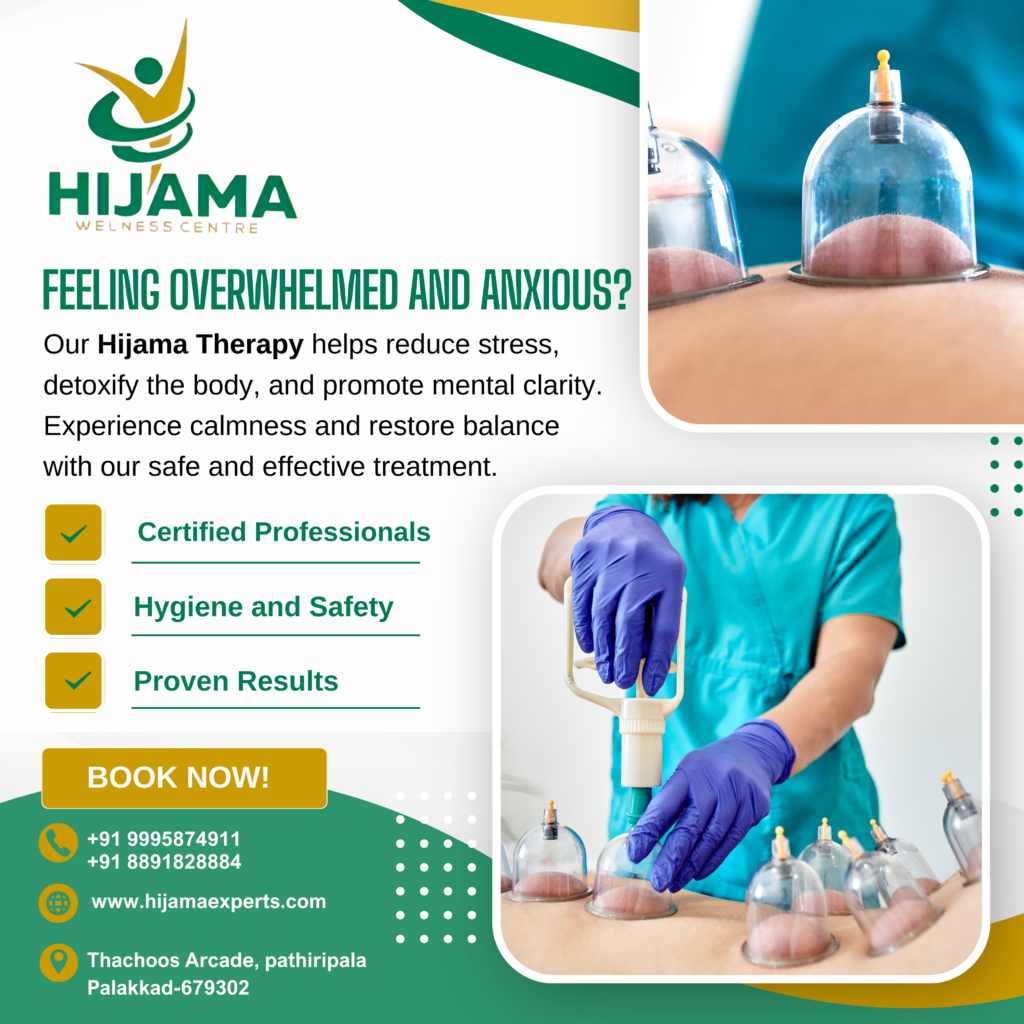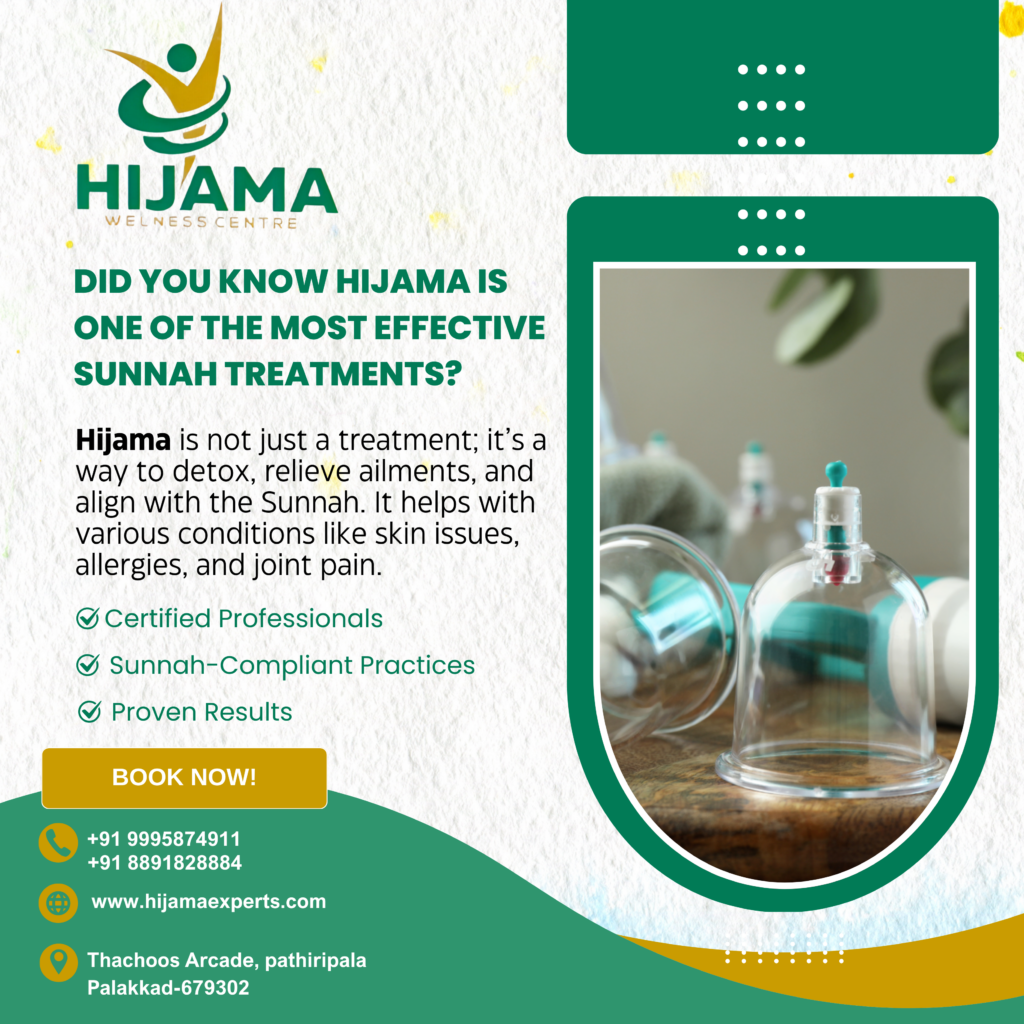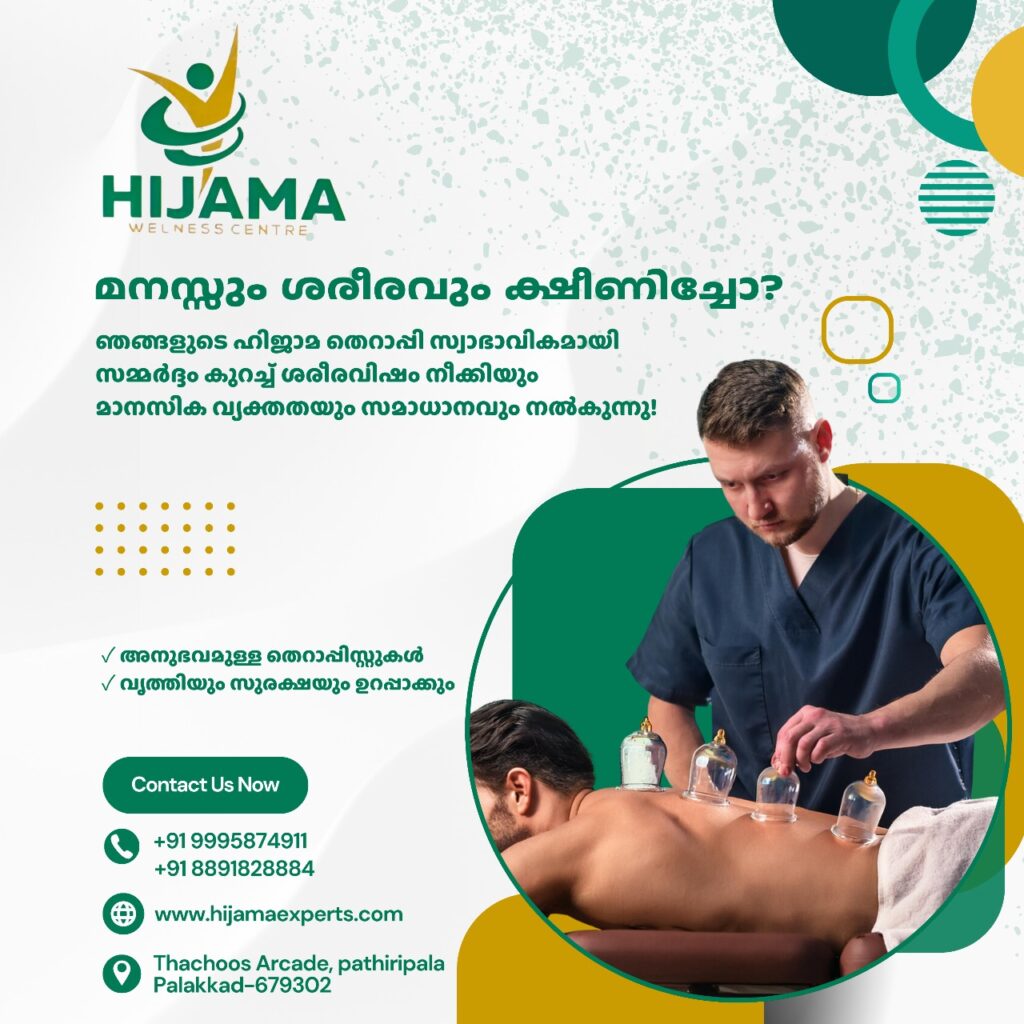Hijama therapy, also known as cupping therapy, is an ancient healing practice that has been used for centuries to treat various ailments. While it is commonly known for its detoxification benefits, modern research highlights its potential in supporting neurological health and improving blood circulation.
At Hijama Wellness Centre in Pathiripala, Palakkad, Kerala, we specialize in using Hijama therapy to help individuals suffering from neurological disorders, poor circulation, and related health conditions. In this blog, we will explore the science behind Hijama and how it plays a crucial role in enhancing brain function, nerve health, and circulation.
How Hijama Therapy Works
Hijama therapy involves placing suction cups on specific points of the body to create negative pressure, which improves blood flow, oxygen supply, and nerve stimulation. The therapy can be categorized into two types:
Dry Cupping – Uses suction to stimulate circulation and relax the nervous system.
Wet Cupping – Involves small incisions to remove toxins and stagnant blood, improving overall health.
By enhancing circulation and relieving nerve pressure, Hijama therapy provides significant benefits for neurological function and cardiovascular health.
The Role of Hijama in Neurological Health
Enhances Brain Function and Cognitive Clarity
Proper blood circulation is essential for brain function. Hijama therapy helps:
- Increase oxygen supply to the brain, improving memory and focus.
- Remove toxins and waste products that can impair cognitive function.
- Stimulate nerve regeneration, potentially benefiting individuals with neurodegenerative disorders.
Alleviates Nerve Pain and Neuropathy
Neuropathy is often caused by poor circulation and nerve damage. Hijama therapy:
- Improves blood flow to damaged nerves, aiding in repair and regeneration.
- Reduces inflammation, which can contribute to nerve pain.
- Stimulates nerve endings, helping restore sensation in affected areas.
Reduces Stress, Anxiety, and Depression
Stress and anxiety are closely linked to neurological imbalances and poor circulation. Hijama therapy helps:
- Regulate cortisol levels, the hormone responsible for stress.
- Promote relaxation by stimulating parasympathetic nervous system activity.
- Improve serotonin and dopamine levels, enhancing mood and emotional well-being.
Supports Stroke Recovery and Prevention
Stroke occurs due to restricted blood flow to the brain, leading to neurological impairment. Hijama therapy:
- Boosts circulation, reducing the risk of blood clots.
- Enhances oxygenation of brain cells, aiding stroke recovery.
- Promotes neuroplasticity, helping the brain heal and adapt.
The Impact of Hijama on Blood Circulation
Boosts Cardiovascular Health
Poor circulation can lead to high blood pressure, varicose veins, and heart disease. Hijama therapy:
- Stimulates blood vessel dilation, allowing smoother blood flow.
- Reduces toxin accumulation, preventing clot formation.
- Improves arterial flexibility, reducing hypertension risks.
Detoxifies the Blood and Lymphatic System
Toxin buildup in the blood can lead to fatigue, inflammation, and chronic disease. Hijama therapy:
- Removes stagnant blood, allowing fresh, oxygenated blood to circulate.
- Enhances lymphatic drainage, boosting immune function.
- Reduces oxidative stress, which can damage blood vessels.
Improves Circulation in Diabetic Patients
Diabetes often leads to poor circulation and nerve damage. Hijama therapy helps:
- Stimulate insulin function, potentially stabilizing blood sugar levels.
- Improve capillary circulation, reducing the risk of diabetic ulcers.
- Relieve diabetic neuropathy symptoms, such as tingling and numbness.
Scientific Studies on Hijama and Circulation
Studies suggest that cupping therapy increases local blood flow, reduces muscle stiffness, and improves microcirculation. Research has also shown that cupping stimulates the release of nitric oxide, a molecule responsible for blood vessel dilation, which enhances cardiovascular function.
Additionally, cupping therapy has been linked to improved nerve regeneration and reduced inflammation, making it a promising treatment for neurological conditions.
Why Choose Hijama Therapy at Our Centre in Pathiripala, Palakkad, Kerala?
- Experienced and Certified Practitioners – Our team provides safe and effective treatment sessions.
- Personalized Therapy Plans – Tailored to address neurological concerns and circulation issues.
- Non-Invasive and Natural – A drug-free, holistic approach to healing.
- Long-Term Health Benefits – Supports brain health, nerve function, and heart health.
Complementary Lifestyle Changes for Maximum Benefits
To enhance the effects of Hijama therapy, consider adopting these healthy lifestyle habits:
- Balanced Diet – Include foods rich in antioxidants, omega-3s, and B vitamins for brain and heart health.
- Regular Exercise – Engage in walking, yoga, or strength training to improve circulation.
- Hydration – Drink enough water to flush out toxins and maintain vascular health.
- Stress Management – Practice deep breathing, meditation, and mindfulness to support neurological balance.
- Adequate Sleep – Prioritize 7-9 hours of quality sleep for optimal brain function and recovery.
Hijama therapy offers a natural, effective solution for improving neurological health and blood circulation. By enhancing oxygenation, detoxification, and nerve function, it serves as a holistic remedy for individuals facing neurological disorders, poor circulation, and stress-related conditions.
If you’re looking for a safe and natural way to boost brain function, relieve nerve pain, and enhance circulation, consider Hijama therapy at our Hijama Wellness Centre in Pathiripala, Palakkad, Kerala. Book your session today and experience the transformative healing power of cupping therapy.
Revitalize your mind and body with Hijama—begin your journey to better health today!


